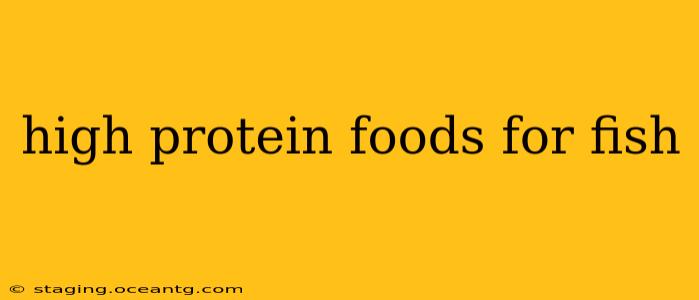Keeping your fish healthy and vibrant requires a diet rich in protein. Protein is crucial for growth, tissue repair, and overall well-being in aquatic life. However, not all protein sources are created equal. This comprehensive guide explores the best high-protein foods for fish, catering to different species and their specific dietary needs. We'll delve into commercially available options and natural food sources, ensuring your finned friends receive the optimal nutrition they need to thrive.
What are the best high-protein foods for fish?
The best high-protein foods for fish vary greatly depending on the species. Some are carnivorous, requiring a diet high in animal protein, while others are omnivores or herbivores with different nutritional needs. Generally, high-quality protein sources are essential for all fish, providing the building blocks for healthy growth and strong immune systems. Examples include:
- High-quality fish flakes: Many commercially available fish flakes are formulated with a good balance of protein, vitamins, and minerals, making them a convenient option for many fish species. Look for options that list specific protein percentages on the packaging and avoid those with excessive fillers.
- Bloodworms: A popular live food, bloodworms are naturally high in protein and essential nutrients. They are a great addition to a varied diet for many fish.
- Daphnia: These small crustaceans are another excellent live food source, rich in protein and other essential nutrients, suitable for many species.
- Brine shrimp: Brine shrimp, particularly adult forms, are a good protein source, often used as a staple food for fry (baby fish) and smaller species.
- Mysis shrimp: These small shrimp are a nutritious and protein-rich food for a variety of fish. Their larger size makes them ideal for larger fish.
- Blackworms: Similar to bloodworms, blackworms are another nutritious live food, rich in protein and essential fats.
- Commercial fish pellets: High-quality fish pellets specifically formulated for your fish species offer a balanced and convenient way to provide protein. Always choose pellets appropriate for your fish's size and dietary needs.
What are the protein requirements of different fish species?
Protein requirements vary significantly between fish species. Carnivorous fish, like many cichlids and predatory fish, require a higher protein diet than omnivores or herbivores. Herbivorous fish, such as many goldfish varieties, require less protein and more plant-based matter. It's crucial to research the specific needs of your fish species to provide a balanced and appropriate diet. Consult reputable aquatics sources or your local fish store for species-specific advice.
How much protein should my fish eat?
There's no single answer to this question, as it depends on several factors:
- Species: As mentioned, protein needs vary greatly between species.
- Age: Young, growing fish generally require more protein than adult fish.
- Activity level: More active fish require more energy and, consequently, more protein.
- Overall diet: A varied diet containing other essential nutrients helps ensure proper protein utilization.
Overfeeding can lead to water quality issues and obesity in fish, so it's best to follow feeding guidelines provided by your fish food manufacturer or consult with an expert. Observe your fish for signs of healthy growth and adjust feeding amounts accordingly.
What are some natural high-protein foods for fish?
While commercially available options are convenient, incorporating natural foods can enhance your fish's diet. Depending on the species, suitable options include:
- Insects: Small insects like fruit flies (for smaller species) or even crickets (for larger species) can be a good supplemental source of protein. Always ensure insects are clean and free of pesticides.
- Small invertebrates: Some fish will readily consume small snails, crustaceans, or other invertebrates found in natural environments. However, be cautious about introducing anything from the wild to your tank, as it could introduce parasites or diseases.
- Vegetables: While not a primary protein source, some vegetables, like blanched spinach or zucchini, can contribute to a balanced diet and provide some protein.
Always carefully research the suitability of any natural food before introducing it to your fish's diet.
Are there any risks associated with feeding my fish high-protein foods?
While protein is essential, an excess can be detrimental. Too much protein can lead to:
- Water quality issues: Uneaten food can decompose, increasing ammonia and nitrite levels.
- Obesity: Overfeeding high-protein foods can cause fish to become obese, leading to various health problems.
- Organ damage: Excessive protein consumption can strain the fish's kidneys and other organs.
Always provide a balanced diet and avoid overfeeding.
By understanding the specific nutritional requirements of your fish and providing a varied diet rich in high-quality protein, you can ensure their health, vitality, and longevity. Remember to consult reliable sources and adjust feeding habits according to your fish's individual needs.
